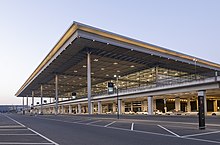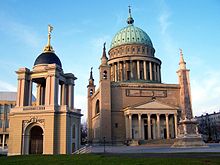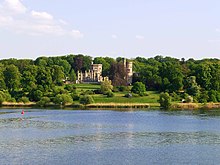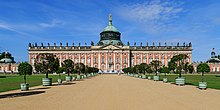- For other places with the same name, see Potsdam (disambiguation).
Potsdam is the capital of Brandenburg and borders Berlin. The town has a population of about 180,000 (2019). It is widely known for its castles and landscape as a World Heritage Site. Potsdam is more than 1000 years old. Many historic buildings are under re-construction after World War II and the period of the German Democratic Republic (GDR, or "East Germany").
Understand
[edit]
Located about 30 km southwest of the capital, Potsdam was used as a residence for the kings of Prussia when they wanted to get away from the big-city trouble (and potential rabble-rousers) in Berlin, and in a way it still has a similar function, as many well-to-do people from Berlin have either moved here or have bought a second residence here since reunification in 1990. Potsdam also serves as the capital of the Bundesland of Brandenburg, after an attempt to reunite Berlin and Brandenburg in a single Bundesland failed in the early 1990s.
During the last days of World War II, following the surrender of the Nazis, the Potsdam Conference was held at Schloss Cecilienhof from 17 July to 2 August 1945, where British prime minister Clement Attlee, American president Harry Truman and Soviet leader Joseph Stalin met to discuss the administration of occupied Germany. Potsdam was chosen due to being close to Berlin, but still offering a relatively undestroyed representative building that could host major world leaders for a conference.
Until reunification, Potsdam was isolated from the former West Berlin. The last train station before the former GDR was Wannsee. Many of the buildings that are visible today have been reconstructed after the bombings of the Second World War and after the lax care of the East German Government. After the Great Elector declared that "The whole island must become a paradise", the city was built according to the plans of five architects: Peter Joseph Lenné, Georg Wenzeslaus von Knobelsdorff, Carl Phillipp Christian von Gontard, Karl Friedrich Schinkel and Friedrich Ludwig Persius, and under the direction of King Frederick the Great and Emperor Wilhelm II.
Most attractions in the city are UNESCO World Heritage sites: Sanssouci Park and the Crown estate of Bornstedt, the New Garden (including the Pfingstberg and the Russian colony of Alxandrowka), Babelsberg Park and Sacrow Park.
The suburb Babelsberg is home to the Media City Babelsberg (Medienstadt Babelsberg), an area joining movie and media people together. The film studio Babelsberg, the Konrad Wolf Film University of Babelsberg and other schools, radio and TV stations, a museum and an archive, an amusement park and much more is located there. Babelsberg was one of the first large scale studio complexes in the world and movies produced here enjoyed an excellent reputation until the Nazi era and World War II destroyed much of Germany's cultural output and potential. Today the Berlin area is competing with the Cologne region for the top spot in the German media landscape.
Tourist information
[edit]- Potsdam tourism website
Get in
[edit]By suburban rail
[edit]Potsdam is in the Berlin metropolitan area and served by both inner and outer suburban trains, respectively called the S-Bahn and RegionalExpress (RE) trains. Several lines serve Potsdam, but not the same parts. Almost all trains that go from Berlin to Potsdam can be used with an ABC or BC zone ticket for Berlin.
For central Potsdam, you should travel to 1 Potsdam Hauptbahnhof., which is the terminus for S-Bahn S7 and also served by Regionalexpress RE1 towards Brandenburg or Magdeburg. From the most centrally located Berlin station, Berlin Friedrichstraße, it takes 47 min to Potsdam Hbf by S1 (40 min: S7+S1) and 28 min by RE1, the latter making limited stops in inner areas.
For Schloss Sanssouci, Park Sanssouci and Krongut Bornstedt, you should take an RE1 train direction Brandenburg (not Magdeburg) and get off at 2 Charlottenhof, the station following Potsdam Hbf. From there the mentioned attractions are 10 minutes away on foot.
For Babelsberg, you should take the S-Bahn S7 to Babelsberg, the station preceding Potsdam Hbf.
For the Medienstadt (film studios), you should take an RE7 train direction Bad Belzig or Dessau and get off at Medienstadt Babelsberg.
Your ticket must be valid for at least Berlin zones BC in order to travel to Potsdam; however, tickets and travelcards valid for the entire metropolitan area are of course also valid. For more information on this, visit the local transport website of the Berlin metropolitan area.
By bus
[edit]While Berlin has had intercity bus service even before the deregulation of the market the fact that buses can't sell tickets for trips shorter than 50 km makes Potsdam somewhat underserved. There are several stops in Berlin however and ZOB (the central bus station) is served by the S-Bahn.
By car
[edit]- highway A10 or A115
By plane
[edit]
From Berlin Brandenburg International Airport (BER IATA), suburban train line RB22 provides hourly service to Potsdam Hbf (48 min, €3.60 - Nov 2020), and also stops at Potsdam Charlottenhof. If you're going to Babelsberg, you should change to S-Bahn S7 at Potsdam Hbf. Alternatively, the express bus service BER2 travels from the airport to the main station, with stops made in Teltow and Stahnsdorf before reaching the Potsdam Stern Center stop and terminating at the Potsdam Hbf. The express nature of this service incurs an extra charge, which can be paid with cash or card to the driver.
Get around
[edit]By tram and bus
[edit]
The tram and bus system in Potsdam is very modern and overall excellent though confusing. Potsdam is (together with Berlin and the rest of Brandenburg) part of the VBB transportation network. That enables you to change trams and buses pretty much at will, as long as your ticket is valid for the zone you're in. The inner city of Potsdam is in Zone A, the outer parts are in Zone B, and the hinterland is Zone C.
Potsdam lies in Berlin's Zone C, so if you have a ticket for Berlin ABC or Berlin BC, you can use public transport in Potsdam with it as well. Don't confuse Potsdam's zones with Berlin's zones.
Tickets can be bought at ticket machines in every tram and bus. Unfortunately they're of no big help when it comes to choosing the right ticket. It's best to get detailed information about prices and zones at Potsdam's central station or on the VBB website.
The transport, although confusing at first, is pretty logically laid out: each tourist attraction has its own bus or tram stop (with the appropriate name) and the staff of the VBB are extremely helpful, although language barriers can exist.
For tourists there are five main lines in and around Potsdam:
- Schlösser-Linie (Palaces Line): Bus No 695 from Potsdam Hauptbahnhof - Bahnhof Pirschheide. With stops for: the Historic Steam Engine House, Sanssouci Palace and Park, the Orangery, the Dragon House, the Belvedere, the New Palace and a path to the Charlottenhof Park.
- Krongut-Linie (Crown Estate Line): Tram No 92 or 96 from Potsdam Hauptbahnhof - Bornstedt Kirschallee/Campus Jungfernsee (respectively). These two tram lines follow the same path up until Campus Fachhochschule, with stops for: the City Center (Platz der Einheit or Brandenburger Str.), the Dutch Quarter (Nauener Tor), the Russian Colony (Alexandrowka) (Puschkinallee), the Pfingstberg (Am Schragen is next to the walking path), and the Volkspark and Fachhochschule at Campus Fachhochschule. Taking Line 92 to Hannes-Meyer-Str. will, with a short walk, bring you to the Ruinenberg, where you can continue walking in the Park to reach Park Sanssouci or the Bornstedter See. Taking Line 96 will bring you to a more direct Volkspark stop, where you can access the Biosphere, and terminates at Campus Jungfernsee, home to Gisma University of Applied Sciences.
- Tropen-Linie (Tropics Line): From Potsdam Hauptbahnhof - Viereckremise. With stops for: The Historic City Centre, the Russian Colony (Alexandrowka), the Pfingstberg, the Potsdam Biosphere and the Volkspark.
- Cecilienhof-Linie (Cecilienhof Line): From Potsdam Hauptbahnhof take Tram Nos 90/92 to Reiterweg / Alleestraße, then Bus No 692 - Höhenstraße. With stops for: the Russian colony (Alexandrowka), the New Garden, the Marble Palace, Celcilienhof Palace and the Pfingstberg.
- Filmstadt-Linie (Film City Line): From Potsdam Hauptbahnhof - Stern-Center / Gerlachstraße. With stops for: Babelsberg palace and park, Flatow Tower, the Arcaded Court House, the Neubabelsberg Villa Colony, Babelsberg Media City and the Film Park.
By bike
[edit]Nextbike operates in Potsdam. Another operator is Donkey Bike, which has stations in nearby Wannsee, around 6 km away.
Cycling in allowed in the Neuer Garten, but only on some paths in Park Sanssouci such as the Ökonomieweg which traverses the park from west to east.
By e-hailing
[edit]Uber and Free Now cover the city.
See
[edit]
Most palaces are managed by the Prussian Palaces and Gardens Foundation Berlin-Brandenburg, SPSG. They offer a combined ticket (sanssouci+ Ticket) giving you access to most of their palaces in Potsdam on one day. The price for adults is €19 and for concessions €14.
- 1 Holländisches Viertel. Right in the middle of Potsdam are the "Dutch Quarters", built in the 18th century by Dutch master builder Johann Boumann to attract other Dutch artisans. The quarters consist of 134 red-brick houses, divided into four blocks. The history of the Dutch Quarters can be seen in the Jan Bouman house in Mittelstraße 8.


- 2 Alter Markt. The old market is the historic city center, with the Stadtschloss (city castle) next to it. You can visit the Nikolaikirche there.
- 3 New Market. The new market is an original preserved market square from the 18th century.

- 4 Garrison Church. The Garrison Church includes a Coventry chapel, an exhibition about the history of the place and a viewing platform at a height of 57 meters.

- 5 Park Babelsberg (Accessible via bus 616, which can be accessed from Babelsberg at Rathaus Babelsberg. The bus comes infrequently, but the alternative is to walk up and through the Park to reach the castle, which has an incline. The bus terminates and begins at Griebnitzsee, so you can also take the bus from there.). A beautiful park with a gothic-style castle, several nature paths, and a few other historical landmarks. It is also part of the World Heritage site. A university housing complex is placed here, so expect some students. From the park, you can cross a bridge into Klein Glienicke, where you could, by foot, walk to Schloss Glienicke and Jagdschloß Glienicke in Berlin.
- 6 Krongut Bornstedt, Ribbeckstraße 6/7. An architectural complex in Italian style with a palace and a garden.
Sanssouci
[edit]- 7 Park Sanssouci. Daily 08:00-dusk. This immense park outside Berlin in the city of Potsdam is on the UNESCO World Heritage list, along with all its outbuildings, such as Sanssouci Palace and New Palace. Walk around this park with its many castles, follies, cascading terraces, mini-gardens, and romantic ruins. Free.
- 8 Sanssouci Palace (Schloss Sanssouci), Maulbeerallee, ☏ +49 331 9694200. M closed. A fabulous rococo palace with amazing interiors. The baroque decoration is wonderful. Get there early: there is a 2000 person/day entry limit at Schloss Sanssouci. Adults €12, concessions €8.
- 9 Gemäldegaleria. The beautiful collection of paintings at the Sanssouci Palace.

- 10 New Palace (Neues Palais), Am Neuen Palais, ☏ +49 331 9694200. Tu closed. The Neues Palais is also worth a visit. One of the most noteworthy rooms in the palace is the Konzertsaal (concert hall) - dripping in rococo glory. This is also adjacent to one of the University of Potsdam's campuses, Am Neuen Palais, so you can expect students and faculty in the surrounding areas. Adults €8, concessions €6 (including guided tour or audio guide).
Nauener Vorstadt
[edit]
- 11 The New Garden (Neuer Garten). Daily 08:00-dusk. Stroll around New Garden (part of the UNESCO world heritage ensemble), on the banks of the river Havel. Spanning an area of 102 hectares, this park was created in 1787 by Friedrich Wilhelm II in contrast to the Baroque Park Sanssouci. It borders with two lakes, and hosts the Marble Palace and the Palace Cecilienhof. It was here that Attlee, Stalin and Truman met for the Potsdam Conference, at the end of World War II. Free (suggested donation €2).
- 12 Cecilienhof Palace (Schloss Cecilienhof), Im Neuen Garten 11 (in the New Garden), ☏ +49 331 9694200. M closed.
- 13 Marble Palace (Marmorpalais), Im Neuen Garten 10, ☏ +49 331 9694222. M closed. In winter only open on weekends. Adults €6, concessions €5.
- 14 Former KGB Prison Potsdam (Gedenk- und Begegnungsstätte Ehemaliges KGB-Gefängnis Potsdam), Leistikowstr. 1. Tu-Su 14:00-18:00, M closed. Memorial and meeting place at the former KGB prison. From August 1945 it was occupied by Soviet forces. It was reconstructed as a prison for counterintelligence. Today it's been left standing to remind people of the depressing reality of dictatorships. Free.
- 15 Russian Colony, Alexandrowka 2. Alexandrowka consists of a few "Russian Style" houses built for Russian immigrants during the reign of "The Soldier King". House No. 2 (Haus 2) has a very interesting museum while House No. 4 (Haus 4) has an excellent café.
Museums
[edit]
Potsdam has several interesting museums to offer.
- 16 Haus der Brandenburgisch-Preußischen Geschichte, Am Neuen Markt 9, ☏ +49 331 6208550. A museum about Prussia's history.
- 17 Museum of Natural History (Naturkundemuseum Potsdam), Breite Straße 13, ☏ +49 331 2896707.
- 18 Film Museum, Breite Straße 1A, ☏ +49 331 2718112. Exhibitions about cinema history in Potsdam and movie theatre.
- 19 Potsdam Museum, Am Alten Markt 9 (at the Dutch District), ☏ +49 331 2896808. M closed.
- 20 Altes Rathaus. Changing exhibitions at the old town hall.
- 21 Glienicke Bridge (Glienicker Brücke). This bridge between Berlin and Potsdam spans the Havel River to connect the cities of Potsdam and Berlin near Klein Glienicke. It was completed in 1907. The bridge was used to exchange spies.
Nearby
[edit]- Schloss und Schlosspark Glienicke (Glienicke Palace, Casino and Garden) in Berlin/Steglitz-Zehlendorf
- The Pfaueninsel (Peacock Island) in Berlin/Steglitz-Zehlendorf is a small island with free living peacocks.
University of Potsdam
[edit]- The University of Potsdam has three campuses, located in Golm, Am Neuen Palais, and Griebnitzsee.
- Am Neuen Palais is concurrent with Park Sansoucci and the New Palace. Several main University buildings are located here, as well as the humanities faculties.
- Golm is the University of Potsdam's hub for research, innovation, and STEM. You can reach the campus via buses 605, 605, X1, and X12, or take trains RB21/22. Additionally, Potsdam Science Park is located in Golm, boasting start ups, laboratories, Max Planck Institutes (Colloids and Interfaces, Molecular Plant Physiology, and the Albert Einstein Institute), and the Fraunhofer Gesellschaft.
- The Griebnitzsee campus predominantly hosts the social sciences and law faculties. The Hasso Platner Institute is also located here. It is possible to access the Griebnitzsee and walk along its water. The campus is accessible via several buses, trains, and the S7 Sbahn.
Do
[edit]

- Cycling. Take a cycling tour of the city.
- Climb the 1 Babelsberg
- Visit the 2 Dutch quarter, the 3 Russian Colony, and the 4 Weberviertel in Babelsberg (the 'weaver's quarter', built to accommodate artisans from Bohemia) - three architectural oddities commissioned by the Prussian kings to attract foreign craftsmen to Potsdam.
- 5 Nikolskoe. Just north of the city, in the woods overlooking the river, is a historic Russian church and lodge by the name of Nikolskoe. Now a popular cafe, it makes for a good pit stop on the way to nearby Peacock Island.
- 6 Lake Griebnitz and Neubabelsberg. Walk around the picturesque south bank of lake Griebnitz, and into the streets of Neubabelsberg - a typical German 'Villenkolonie' of the Belle Epoque. Many of the grand homes' Jewish occupants were evicted by the Nazis, who then moved in themselves.
- 7 Filmpark Babelsberg, Großbeerenstraße 200, ☏ +49 331 7212750. Movie theme park. Well worth a visit, the first German expressionist film in the world was made at these studios. The next-door studios are home to Gute Zeiten, Schlechte Zeiten, a famous German soap opera. Day tickets: €21 adults, €17 students, €14 children (4-16).
- 8 Studio Babelsberg, August-Bebel-Straße 26-53. The Babelsberg film studios - Germany's Cinecitta. The centre of German celluloid expressionism, Marlene Dietrich, Fritz Lang and so many others worked here in the 1920s. Quentin Tarantino shot his 2009 film Inglourious Basterds on the premises. Studio tours are offered (in German only) on request at least 10 days in advance (☏ +49 331 7212132) and cost €25 per person (minimum 2 people).
- Deutsches Filmorchester Babelsberg (German Film Orchestra Babelsberg). Based in the Studio Babelsberg, this orchestra gives public concerts (not only in Potsdam).
- 9 Potsdam Royals (American Football), Am Luftschiffhafen 2. The Potsdam Royals were founded in 2005, and advanced to the top-level German Football League season in 2018. They play 14 games a season in autumn.
- Potsdam Palace Night (Potsdamer Schlössernacht). in August. A two-day event with concerts, dances, theatre, lectures on literature and fireworks. Adults €39, concessions €29.25 (valid for one day only).
- Private Potsdam Tours can be booked with local historians. These are customized tours by foot or in a private vehicle, taking in the majority of all sights within a day.
Buy
[edit]- The Dutch Quarter (Holländisches Viertel) has over 70 antique shops.
- Fruit Wines are made in the Potsdam-Werder area with flavours such as sour cherry, strawberry, blackberry. There is a store at the central station (opposite of the S-Bahn information center) where you can buy them, although if you have time, the nearby Kaufland (where the Sanssouci buses leave, also in the train station) has the same wines at far cheaper rates.
Eat
[edit]Budget
[edit]All these are in the city centre:
Mid-range
[edit]- 8 Lindner Esskultur, Jägerstraße 16, ☏ +49 331 73042562. M-F 09:30-19:00, Sa 08:30-19:00, Su closed. The Potsdam branch of the bakery and delicatessen chain.
- 9 Restaurant Dreimäderlhaus, Hermann-Elflein-Straße 12.
- 10 Der Butt, Gutenbergstraße 25.
- 11 Brasserie zu Gutenberg, Jägerstraße 10.
- 12 Restaurant Alexandrowka1, Russische Kolonie 1.
Splurge
[edit]Drink
[edit]Potsdam's nightlife is a bit dominated by the near Berlin, but there are some good clubs and pubs worth visiting. Interesting pubs you find in the Holländer Viertel around Mittelstraße or in the city.
Budget
[edit]Pubs
[edit]- 1 Pub à la Pub, Breite Straße 1 (near the new city castle), ☏ +49 331 240726. Student pub.
- 2 KuZe, Hermann-Elflein-Straße 10, ☏ +49 331 6471026. Cultural centre and pub.
- 3 Olga, Charlottenstraße 28. Alternative pub. Very basic furniture. The pub is operated by basic democratic club.
Clubs
[edit]- 4 Archiv, Leipziger Straße 60. Alternative youth centre. Here you regularly find parties and concerts.
- 5 Freiland Potsdam, Friedrich-Engels-Straße 22. It is a big area near the Hauptbahnhof where you find a lot of different activities: concerts, parties, youth clubs, art clubs and a lot of social organisations.
Mid-range
[edit]Pubs and cafes
[edit]- 6 Hafthorn, Friedrich-Ebert-Straße 90, ☏ +49 331 2800820. Famous pub with a really nice Biergarten in summer and it is famous for its handmade burger.
- 7 La Leander, Benkertstraße 1, ☏ +49 331 5838408. Coffee/bar for the gay-lesbian-scene, but also hetero guest are very welcome.
- 8 Das Café Heider, Friedrich-Ebert-Straße 29, ☏ +49 331 2705596.
- 9 Waschbar, Geschwister-Scholl-Straße 82. Szenekneipe. Here you have a lot of different beers, menus and you can wash your clothes.
Clubs
[edit]- 10 Club Charlotte, Charlottenstraße 31 (located directly in the city), ☏ +49 331 280710. Nice concerts and parties are being held here.
- 11 Waschhaus, Schiffbauergasse 6 (near the Hans-Otto-theatre), ☏ +49 331 271560. M-F 12:00-18:00. Here you find parties, concerts, cinema, art exhibitions etc.
- 12 Lindenpark, Stahnsdorfer Str. 76/78, ☏ +49 331 747970. M-F 10:00-18:00. The traditional address in Babelsberg for concerts, parties, skater park and more.
- 13 Palmenzelt, Lange Brücke 6, ☏ +49 331 2759225. This club is only open in autumn, winter and early spring. The parties take place between a lot of palm trees. In summer, the club organizes parties on a ship, located at the harbour (near main station).
Sleep
[edit]Many visitors come to Potsdam on a day trip from Berlin, where the extensive accommodation base caters to every taste and budget, and staying there is a commendable option. There are also ample choices for travellers in Potsdam.
Budget
[edit]- 1 Quartier (Hostel Pension Backpackers), Ribbeckstraße 41, ☏ +49 331 2739939. Check-in: 16:00 - 20:00, check-out: 11:00. Directly on the border of the park. For breakfast, the Potsdam Hostel offers a wide range of option everyday from 07:00. Gender exclusive shared rooms come with 4 beds and include access to bathrooms and showers. Community room offers complete kitchen facilities, TV, free wireless access, as well as a PC. €19/bed/night.
- 2 Potsdam-Pension, Karl-Liebknecht-Straße 92, 14482 Potsdam (use the postcode, because the street exists twice in Potsdam). Single room from €30.
- 3 Youth Hostel Potsdam - Haus der Jugend. single room from €21.
- 4 Pension Scheffler, Grenzstr. 11, 14482 Potsdam, ☏ +49 331-705284. from €15.
- 5 Gästehaus Urban, Charlottenstraße 97. single room from €30.
Mid-range
[edit]- 6 Avendi - Hotel am Griebnitzsee, Rudolf-Breitscheid-Str. 190-192, ☏ +49 331 7091-0.
- 7 Seminaris SeeHotel Potsdam, An der Pirschheide 40 14471 Potsdam, ☏ +49 331 - 9090-0. Single from €91.
Splurge
[edit]- 8 MAXX Hotel Sanssouci Potsdam, Allee nach Sanssouci 1, ☏ +49 331 90910, potsdam@maxxhotel.com. The hotel rooms are inspired by German film and cinema history.
- 9 NH Potsdam, Friedrich-Ebert-Str. 88, ☏ +49 331 23170, nhpotsdam@nh-hotels.com. Hotel is the former "Palais Brühl" from the time of Frederick the Great (19th century). It is located in the heart of Potsdam, in the Dutch district.
- 10 Mercure Potsdam, Lange Brücke. The socialist-era concrete tower has grown to be a notorious eyesore, with ongoing public discussions whether to have it removed for spoiling the view and harmony of the gradually-rebuilt historic city centre. That said, to a traveller it provides both central location and unparalleled views, also given the Maupassantesque patency that it is the only place from where you cannot see it. Inside, it has been refurbished to a modern standards, even if lacking a bit on the service front.
- 11 Dorint Sanssouci Berlin/Potsdam, Jägerallee 20, 14469 Potsdam, ☏ +49 331 2740, info.berlin-potsdam@dorint.com. The congress hotel offers 292 rooms and suites as well as a large pool area. from €74 per room/night.
Stay safe
[edit]Potsdam is a safe city for tourists. During daylight the city is full of tourists that visit the amazing castles and gardens.
Connect
[edit]Go next
[edit]- Berlin — this is the most obvious place to go, unless you already came from there
- Werder an der Havel — a small town just west of Potsdam. Every year it is the home of the Baumblutenfest, to celebrate the large amount of fruit trees blooming in spring (especially sour cherry trees, of which they make wine).
- Brandenburg an der Havel — less than 30 minutes away by train
- Magdeburg — the historic capital of Saxony-Anhalt, taking an hour from Potsdam to cover the distance (the train to Brandenburg an der Havel continues to Magdeburg)
- The Potsdam railway station is on a bit of a side line, so for high-speed connections to German cities farther afield, one has to go back to Berlin#Go next


